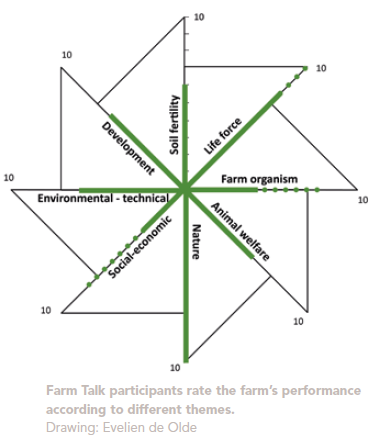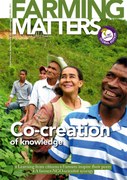In the Netherlands, a peer review method for farmers arose as an alternative to the biodynamic certification system. By collectively observing and discussing sitespecific challenges, these biodynamic farmers experience first-hand the power of collaboration and drive commitment to sustainability beyond the standards of biodynamic certification.
As we pass the rows of lettuce, cabbage and leek, the farmer whose biodynamic farm we are visiting tells us about the birds he has spotted lately, the newly-built nature trail, and the pond where a rare lily last seen 15 years ago has reappeared. The other biodynamic farmers participating in the Farm Talk, two large-scale vegetable producers who each farm more than a hundred hectares, and a dairy farmer, listen, observe and ask questions. Our host shows us the triangular area between the pond, the hedge and the field, long-infested with stinging nettle, which he finally turned into a hay meadow. Later, as we sit at the kitchen table in the farmer’s house reviewing all of the biodynamic aspects of the farm, the visiting farmers suggest the possibility of adding more animals to the farm system in order to close the nutrient cycle. The farmer already keeps bees for honey, and the new hay meadow is only big enough for two cows or heifers. Other options are weighed. Eventually, the host farmer and his wife decide to explore the possibilities for integrating animal husbandry into their farming activities in the coming year.
Initially known as the ‘Mansveltscore’ (after one of the co-founders of this method, Jan Diek van Mansvelt), Farm Talks were developed in 2008 by the biodynamic farming association and the Demeter certification organization in the Netherlands as a potential alternative to the certification system. The method was regularly evaluated and adjusted but it was decided in 2013 that the outcomes of the Farm Talks were not suitable for inclusion in the accreditation for Demeter certification. Nonetheless, the Farm Talks continue as a practice that provides a space for farmers to evaluate and learn from each other’s experiences to support the development of their own farms, and of biodynamic farming in the Netherlands. Approximately 130 Dutch farmers currently participate in the Farm Talks.
Exploring opportunities
-
Photo: Frederieke Bosch - In each Farm Talk a group of four to five peers representing different agricultural sectors visit the farmer whose farm is evaluated. During the biannual visits, a coach from the biodynamic farming association facilitates the process. The host farmer discusses the strengths and challenges faced on the farm, and together with her peers, examine possibilities for development. Through discussion, participants explore the meaning of biodynamic farming and sustainability. This contributes to a collective and context-specific understanding of these concepts.
During the review, the farm is characterised and evaluated against predetermined biodynamic principles. In anticipation of a Farm Talk, the host farmer prepares the visit by revising a set of questions to evaluate her own farm based on eight different, yet related themes (see the figure Farm Talk). Additionally, each host defines possible development actions for the farm. Although the structure of each Farm Talk varies, four phases are observable.
Collective, yet context-specific understanding

Care farming is a popular practice in Western Europe that involves the use of farming practices for therapeutic purposes. Recently, during a farm visit at a care farm, images such as a ‘Rubik’s cube’ or a ‘wizard juggling many plates in the air’ and an ‘octopus’ came to the minds of the farmer peers. These images reflected the farm’s complex organization. Everyone was impressed with the host farmer’s ability to organize the farm’s various tasks around people with special needs and capacities, and to deliver orders timely while dealing both with several care institutions and inclement weather, all the same time. Although these images vary greatly among participants, they often seem to convey a similar message. Moreover, the exercise makes room for creativity and imagination to be expressed and paves the road for a deeper discussion about the farm.
This special constellation of backgrounds helps to develop innovative ideas and insights
After ‘characterising’ the farm, participants rate its performance on the same eight themes the farmer had used to evaluate her own farm before the visit. In the peer review phase, the host farmer discusses her own appraisal and compares her ratings to the scores given by her peers. Differences in the evaluations often form the basis for new insights. From the discussion, issues that could be developed or that required attention are noted. Then, the host selects the aspects she would like to work on, develop, improve, find out or learn. She formulates a specific action plan to reflect these goals that begins with ‘I want…’.
An atmosphere of trust
In the Farm Talks, groups consist of farmers from different sectors. This special constellation of backgrounds helps to develop innovative ideas and insights, as well as to prevent discussions that are too specialised from taking place. The role of the coaches is important to give structure to the meeting and to create a safe and positive atmosphere where challenges can be shared openly. The coach can facilitate the process by interfering when discussions become too technical, by shifting in focus to another farmer, or by introducing aspects not yet discussed.
A Farm Talk requires a frank reflection of the aspects that work well on the farm and those that can be improved, as well as an atmosphere of trust and openmindedness. This is cultivated through transparently communicating the expectations of the talk, an appreciative inquiry and a collaborative and positive attitude. An atmosphere of trust allows colleagues to ask questions and support the farmer through exploring their basic motivations, assumptions, and values together with them, as well as helping them to establish specific development actions.
Evolving together
The experiences here emphasise the importance of an honest reflection and critical discussion of on-farm challenges. Transparency and good facilitation within an atmosphere of trust add to an integrative farm characterisation and actions for future development. Discussing the meaning of biodynamic farming within the context of a specific farm supports the co-creation, understanding, and dissemination of the concept. This is seen in the example at the beginning of this article. After the farm tour, the group of farmers discussed the biodynamic principle of integrating livestock into the system to close the nutrient cycle. The participating farmers gained something. For the farming couple, this meant the opportunity to explore different options for integrating more animals onto their farm. All other farmers were reminded of the importance of ruminants in biodynamic farming for improving soil fertility. Farm Talks not only enable farmers to inspire one another, but they also help to deepen farmers’ own understanding of sustainability, which benefits society at large.
|
|
|---|
Evelien de Olde and Petra Derkzen
Evelien de Olde (evol@eng.au.dk) is a PhD candidate at Aarhus University in Denmark and Wageningen University in the Netherlands.
Petra Derkzen (petra@stichtingdemeter.nl) coordinates the Demeter certi cation for biodynamic agriculture at the Demeter Foundation in the Netherlands.




